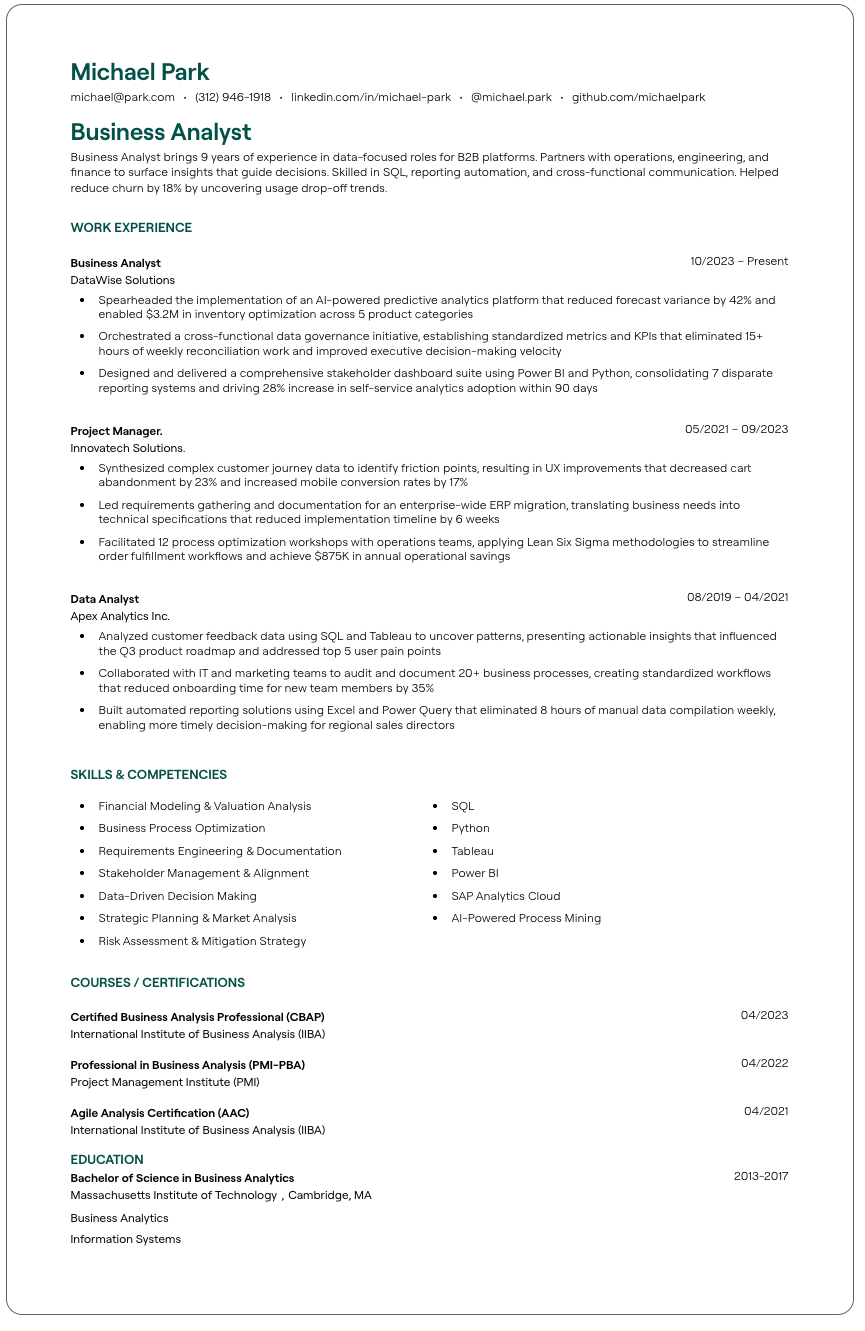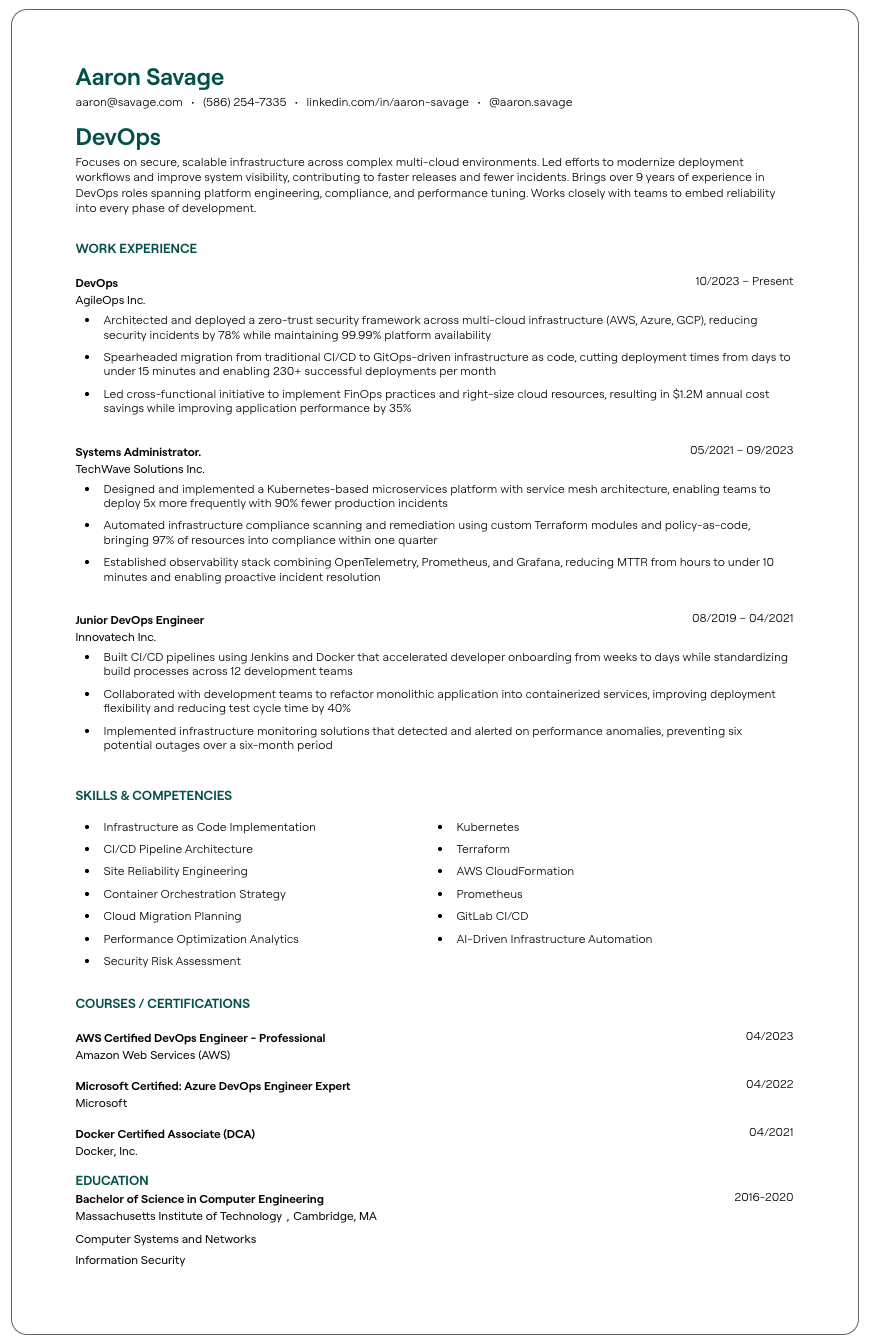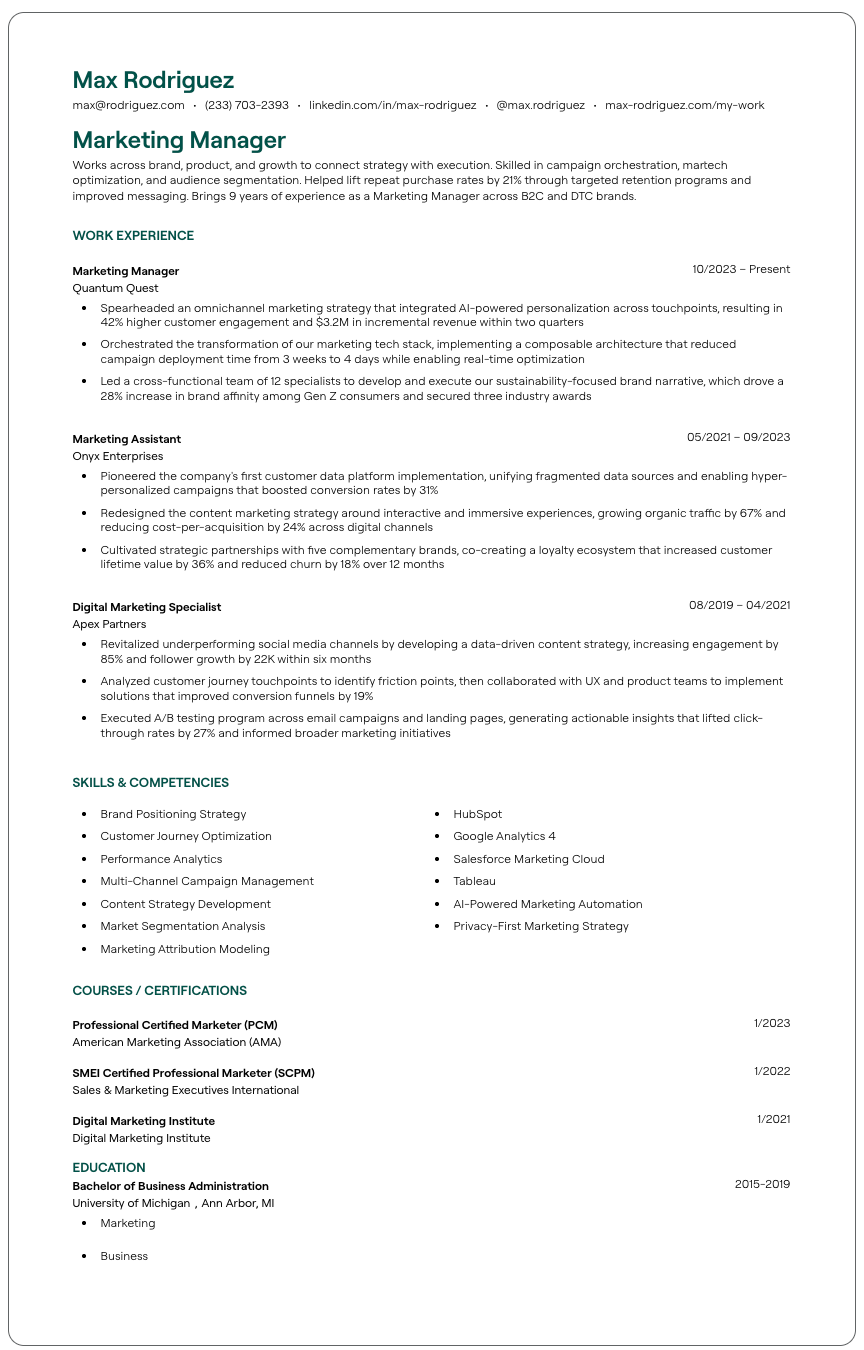3 key takeaways
- Learn the primary purpose of a resume, which is to help job seekers make a strong first impression and allow employers to assess each candidate’s fit quickly.
- Discover how resumes have other use cases, from helping candidates showcase career highlights and communicate their personal brands to helping recruiters assess candidates’ professionalism and prepare interview questions.
- See how you can make a resume for free with Teal's Resume Builder.
Applying to jobs can feel like shouting into the void. You send out dozens of resumes and hear nothing back. Or worse: you land an interview, only to realize the hiring manager barely skimmed what you sent.
So what’s the purpose of a resume, really?
It’s not just a formality. A good resume helps applicants showcase their strengths clearly and helps employers quickly find the right fit. It’s a critical tool for navigating the hiring process—from job boards to interviews—for applicants and employers.
In this article, we break down what a resume actually does. You’ll also learn why it matters to employers and how it acts as a bridge between talent and opportunity.
Resume definition
A resume is usually a one-page or two-page document that concisely sets out your contact information and professional background, including your skills, qualifications, and work experience. Resumes are generally tailored to each job description and are often submitted with a cover letter, depending on the application process.
What is the purpose of a resume?
The primary purpose of a resume is to align your skills and experiences with the needs of a potential employer. It's a strategic tool that focuses on the most relevant aspects of your background, showcasing how you're the right fit for a specific role.
Jaylene Cogswell, a senior director of talent acquisition, says that “the sole purpose of a resume is to document career history and accomplishments for potential employers (i.e. use it to get a job!). Therefore, good resume or bad, qualified or not, we [recruiters] have a baseline intent to start our assessment from.”
Cogswell’s quote illustrates something important: The purposes of resumes differ for applicants and employers. Let’s dive into these differing purposes below.
What is the purpose of a resume for applicants?
For job seekers, a resume is more than just a document—it's a personal marketing tool designed to showcase your professional identity and qualifications. But it's about more than just your job search and landing an interview.

A resume serves the primary purpose of presenting your relevant skills, experiences, and professional accomplishments in a way that aligns with the specific job description of the role you're targeting. Making a resume with this tailored approach helps you make a strong first impression, demonstrating to potential employers how you can add value to their team.
Here are some things you can do with your resume:
1. Showcase career highlights
The key to a good resume lies in how you spotlight your most significant achievements and milestones. By emphasizing relevant achievements like key projects, awards, or quantifiable results, you offer tangible proof of your value, going beyond a simple list of job duties.
2. Target specific opportunities
Tailoring your resume for each job application helps you focus on the most relevant aspects of your background. This customization increases your chances of grabbing the attention of a prospective employer by directly addressing their needs.
3. Facilitate networking efforts
Sharing your resume with contacts in your professional network can lead to referrals and opportunities that aren't publicly advertised. It serves as a conversation starter and a summary of your qualifications when you’re connecting with others in your field, making it easier for your network to advocate for you.
4. Position yourself for career growth
Writing a resume reflects a clear career trajectory, showing how your work history (roles, skills, and responsibilities throughout every resume section) has evolved over time. Resumes that include measurable impact and achievements (such as the percentage of projects delivered on time or the number of clients served) can even help you track and quantify your career growth. This progression gives employers confidence you're capable of growth.
You can even use resumes to apply for promotions or new roles within your current company.
5. Personal branding
Your resume reflects your professional brand. It communicates who you are, what you stand for, and the unique value you bring to the table.
As Professor Heather Austin, Career Coach and Featured YouTube Educator, explains, “No matter your background, the resume is your story. Make it clear, make it focused, and show how your strengths align with the job.”
What is the purpose of a resume for employers?

Resumes aren’t just for storytelling. Employers use them to make fast, high-stakes decisions about a candidate’s fit for a role. They don’t read every word—they skim. And often, they’re making up their minds in just a few seconds.
This kind of rapid decision-making is what Malcolm Gladwell calls “thin-slicing” (the ability to make accurate judgments based on limited information) in his book Blink: The Power of Thinking Without Thinking. It’s common in hiring, where recruiters often decide if someone’s a potential fit in just a few seconds.
“Most recruiters spend ~5 seconds looking at a LinkedIn profile—and in those 5 seconds, they know if a candidate is a potential fit,” says Ryan Heintz, Founder and CEO at Alloyed. “It’s instinctual, but trained by speaking with 25+ candidates every single week.”
As David Fano, tech founder and CEO of Teal, puts it, this extends to reviewing resumes, too:
“Hiring managers don’t read your resume. They scan it. Whether they’re hiring a sales associate or a CEO, the goal is the same: fill the role quickly. That means they’re not lingering on every sentence. They’re scanning for signals: Do you have the right experience? Can you drive results? Are you worth a deeper look?”
Here are some things employers use resumes for:
1. Screening candidates
In the first pass, most recruiters use an F-pattern (top-down, left-right) or Z-pattern (diagonal scan) to look for key signals—job titles, company names, dates, and results. If those elements aren’t clear, they may skip the resume.
2. Identifying relevant experience
Employers look for specific skills, experiences, and accomplishments that align with the job description. By analyzing the details in a resume, they can assess how a candidate's past work prepares them for the challenges of the role.
3. Streamlining hiring
A resume following best practices makes it easier for a hiring manager or recruiter to assess fit, reducing time spent on mismatched applicants.
4. Assessing professionalism
The quality and presentation of a resume reflect professionalism. Formatting, clarity, and accuracy can indicate attention to detail and communication skills.
5. Planning interview questions
A resume is also the foundation for a hiring manager or recruiter to develop interview questions. Employers may create questions and conversations based on the information provided to get deeper into a candidate's experience.
How to create a good resume
Eye-tracking studies reveal that hirers typically spend only seven seconds reviewing a resume. Here’s how you can write an impactful resume that helps you get noticed by hiring managers and recruiters.
You can create one:
- Manually in Microsoft Word or Google Docs
- Using a design tool, such as Canva
- With a dedicated resume builder, like Teal’s
Regardless of which method you choose, working from a resume template saves you time and helps you make sure you don’t accidentally leave anything out.
Once you’ve decided how to create your resume, you can choose your resume layout (hint: a reverse-chronological format is the most popular), decide which information to include that shows why you’re the best person for the job, and add your contact information.
An easy way to create a stand-out resume is to work from a master resume: a comprehensive document that details all of your career history, qualifications, achievements, and skills.
💡Pro tip: Use Teal’s Resume Builder to create a tailored resume in a few clicks. With various ATS-optimized templates available, you can customize your resume as much as you need to grab recruiters’ attention.
Resume examples
Use these resume examples as a jumping off point for creating your own.
Business analyst

Use this example as a starting point for writing a business analyst resume
Customer success manager

An example of a resume for a customer success manager role
DevOps

Use this example as a guide for writing a resume for a DevOps role
Marketing manager

Here’s an example of a resume for a marketing manager role
Learn More About Teal’s Free Resume Builder.
Frequently Asked Questions
Is a resume the same as a CV?
While the terms “resume” and “CV” are sometimes used interchangeably, they’re different documents. CVs are generally longer and more detailed than resumes. While candidates typically tailor their resumes to specific roles, they don’t do this with their CVs. CVs are commonly used to apply for grant-based, academic, or government roles.
What is an ATS resume?
An ATS-friendly resume is one that can be easily scanned (parsed) and understood by an applicant tracking system, which is software used by many employers. It’s important to have an ATS-friendly resume so that it passes any initial screening and proceeds to the next stage of the hiring process.
Is a resume really necessary?
Yes, resumes are required for most job application processes. They help hirers understand your skills and potential and help them decide whether you’re the right person for the job. Some junior, entry-level roles—for example, a role involving helping out at a cafe on weekends—may not require formal resumes.
What is the purpose of a resume and application letter?
The purpose of a resume and application letter is to present a clear, tailored narrative of your qualifications. While the resume lists your accomplishments and skills, the application letter explains your interest in the position and highlights how your experience aligns with the job, providing a personal touch to your application.
What is the aim of resume writing?
The aim of resume writing is to strategically highlight a candidate’s career accomplishments and skills to align closely with a specific job, making it easier for employers to see the candidate's potential impact. Effective resume writing also enhances networking opportunities, supports career growth, and builds a strong professional brand.





